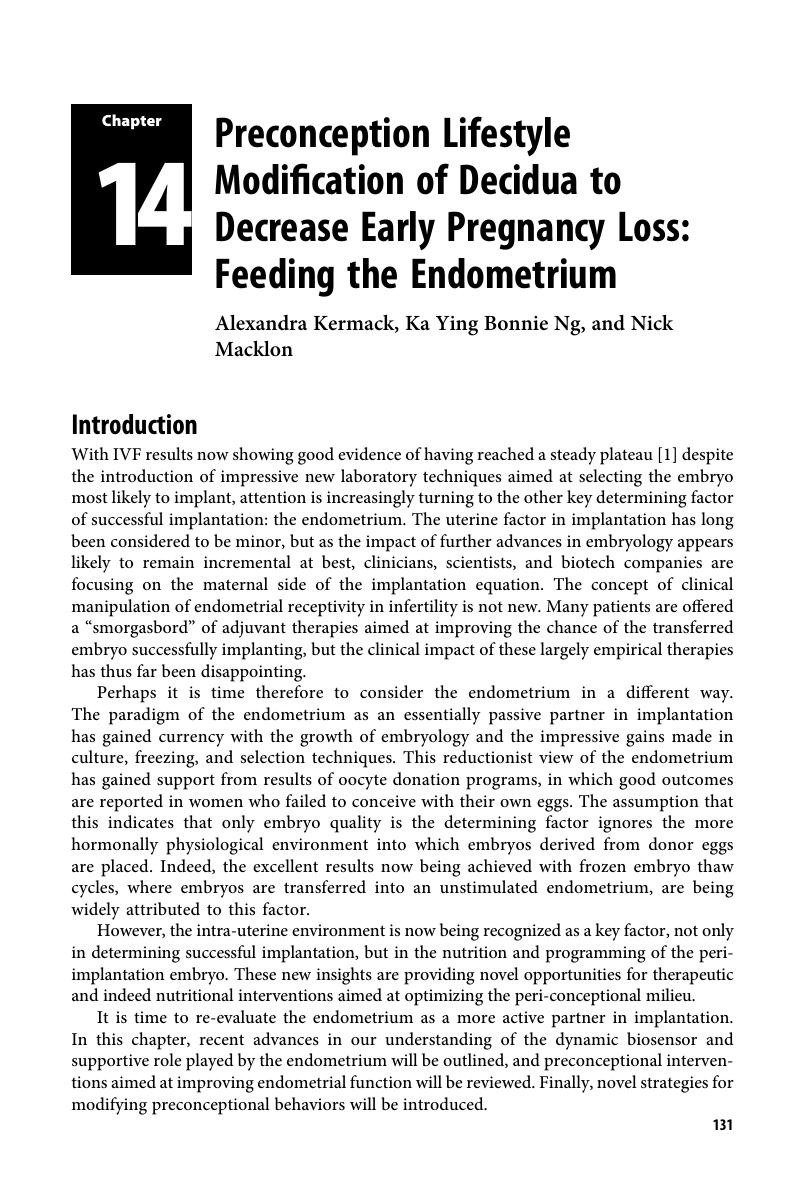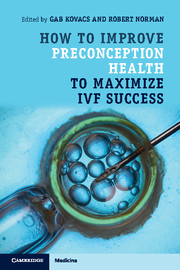Book contents
- How to Improve Preconception Health to Maximize IVF Success
- How to Improve Preconception Health to Maximize IVF Success
- Copyright page
- Contents
- Contributors
- Chapter 1 Introduction
- Chapter 2 The Effects of Nutrition and Micronutrients on Reproductive Success
- Chapter 3 The Effects of Stress on Conception and Pregnancy
- Chapter 4 Preparing for IVF: An Endocrine Perspective
- Chapter 5 Assessment of Endometriosis Before Conception
- Chapter 6 Assessment of Pelvic Abnormalities Prior to Assisted Reproduction
- Chapter 7 Immunological Preparation, Including Vaccinations and Microbiome Management, Prior to ART
- Chapter 8 Optimizing Body Weight to Improve Reproductive Success
- Chapter 9 Lifestyle Modifications – Alcohol, Caffeine, Smoking, Drugs Before ART
- Chapter 10 Environmental Factors to Consider Prior to Conception
- Chapter 11 Pre-Pregnancy Genetic Carrier Screening
- Chapter 12 The Optimal Age for Childbearing
- Chapter 13 Alternative Therapies to Improve Conception Rates
- Chapter 14 Preconception Lifestyle Modification of Decidua to Decrease Early Pregnancy Loss: Feeding the Endometrium
- Chapter 15 Antenatal Factors that may Contribute Toward the Development of Polycystic Ovary Syndrome
- Index
- References
Chapter 14 - Preconception Lifestyle Modification of Decidua to Decrease Early Pregnancy Loss: Feeding the Endometrium
Published online by Cambridge University Press: 08 February 2018
- How to Improve Preconception Health to Maximize IVF Success
- How to Improve Preconception Health to Maximize IVF Success
- Copyright page
- Contents
- Contributors
- Chapter 1 Introduction
- Chapter 2 The Effects of Nutrition and Micronutrients on Reproductive Success
- Chapter 3 The Effects of Stress on Conception and Pregnancy
- Chapter 4 Preparing for IVF: An Endocrine Perspective
- Chapter 5 Assessment of Endometriosis Before Conception
- Chapter 6 Assessment of Pelvic Abnormalities Prior to Assisted Reproduction
- Chapter 7 Immunological Preparation, Including Vaccinations and Microbiome Management, Prior to ART
- Chapter 8 Optimizing Body Weight to Improve Reproductive Success
- Chapter 9 Lifestyle Modifications – Alcohol, Caffeine, Smoking, Drugs Before ART
- Chapter 10 Environmental Factors to Consider Prior to Conception
- Chapter 11 Pre-Pregnancy Genetic Carrier Screening
- Chapter 12 The Optimal Age for Childbearing
- Chapter 13 Alternative Therapies to Improve Conception Rates
- Chapter 14 Preconception Lifestyle Modification of Decidua to Decrease Early Pregnancy Loss: Feeding the Endometrium
- Chapter 15 Antenatal Factors that may Contribute Toward the Development of Polycystic Ovary Syndrome
- Index
- References
Summary

- Type
- Chapter
- Information
- How to Improve Preconception Health to Maximize IVF Success , pp. 131 - 142Publisher: Cambridge University PressPrint publication year: 2018



